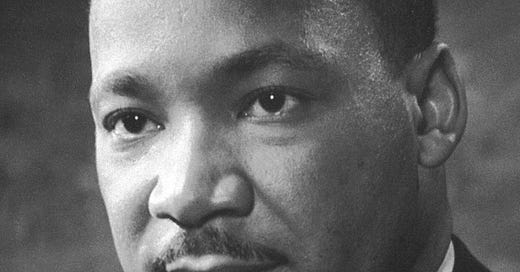The Heresies of Martin Luther King Jr.
Old twitter thread reformatted titled: The heresies of Martin Luther King Jr.: A Thread
MLK Jr. denied the divinity of Christ calling it "harmful" and “detrimental”: "So that the orthodox view of the divinity of Christ is in my mind quite readily denied."
On top of that MLK Jr. denied the virgin birth of Christ: "First we must admit that the evidence for the tenability of this doctrine is to shallow to convince any objective thinker.”
MLK Jr. denied the bodily resurrection of Christ too: “The last doctrine in our discussion deals with the resurrection story. This doctrine, upon which the Easter Faith rests, symbolizes the ultimate Christian conviction: that Christ conquered death. From a literary, historical, and philosophical point of view this doctrine raises many questions.6 In fact the external evidence for the authenticity of this doctrine is found wanting.”
MLK Jr. denied the Second Coming of Christ to judge the living and the dead: “It is obvious that most twentieth century Christians must frankly and flatly reject any view of a physical return of Christ. To hold such a view would mean denying a Copernican universe, for there can be no physical return unless there is a physical place from which to return. In its literal form this belief belongs to a pre-scientific world view which we cannot accept.”
MLK Jr. denied the existence of Hell: “Those who failed to achieve this immortal life were subjected to a physical place called Hell in which they would suffer eternal misery by burning in a blazing fire. In modern times we have come to see that such eschatological thinking is by far incompatible with the modern scientific world view. A physical Heaven and a physical Hell are inconceivable in a Copernican universe.”
MLK Jr. believed the flood story of Genesis was a myth borrowed from paganism: “Looking at the flood story from an objective angle we obviously see that the Hebrews have done nothing but taken a polytheistic picture and placed it in a monotheistic frame, thereby producing from Babylonian mythology an almost verbatim story. . . . If we accept the Old Testament as being ‘true’ we will find it full of errors, contradictions, and obvious impossibilities–as that the Pentateuch was written by Moses.”
MLK Jr. also believed that Christianity borrowed its beliefs from the pagan mystery religions of the Roman world in accordance with the history of religions school of thought and thus the New Testament in his view is erroneous as well.
MLK Jr. denied the dogma of the Trinity: “Others doctrines such as a supernatural plan of salvation, the Trinity, the substitutionary theory of the atonement, and the second coming of Christ are all quite prominant in fundamentalist thinking. Such are the views of the fundamentalist and they reveal that he is oppose to theological adaptation to social and cultural change. He sees a progressive scientific age as a retrogressive spiritual age. Amid change all around he was {is} willing to preserve certain ancient ideas even though they are contrary to science.”
The Lutheran Protestant theologian and philosopher Paul Tillich, who used Heideggerian concepts in his theology, had a heavy theological influence on MLK Jr. MLK Jr. chose the works and theology of Tillich as a part of his dissertation topic for his Ph.D. at Boston University.
MLK Jr. had encountered Tillich's work at Crozer Theological Seminary. One can see his theological influence throughout his thought, like incorporating his view of "sin is separation" and comparing it to segregation in the USA despite some disagreements.
Even though MLK Jr. already denied the divinity of Christ years before he encountered Tillich’s work, his theology was an extension of the ever-moving Western spirit ingrained within them. Tillich and other Western theologians were a part of the "Death of God" movement of the 1960s. These theologians didn't use the title "The Death of God" as a way to note the great apostasy or rising unbelief in God in the West; these theologians openly embraced the notion of "God is dead." They posit God has either ceased to exist or in some way accounted for such a belief. The Death of God movement is sometimes referred to as theothanatology, deriving from the Greek words theos (God) and thanatos (death). This movement of mostly American "theologians" are essentially just post-Christian atheists engaging in theological matters.
"After graduating from college, we do not see a radical change in King’s theology, or a repudiation of his former unorthodox views. Although he did not explicitly preach these liberal beliefs, his messages were still consistent with them. His message would fall under the banner of black liberation theology – he preached a form of Christianity that was reworked to apply to physical freedom of the slaves. The central theme of his Christianity was not Jesus Christ, the son of God coming to earth, it was the deliverance of the Israel from their slavery in Egypt. In his famous “mountaintop” speech, when he was listing the seminal events of history, he mentioned the Exodus, not Christ’s death and resurrection."
For more analysis of Martin Luther King Jr.’s theology and more sources check out this blogpost.




The school education board is made to teach about him too, and to make him seem like a civil rights leader, didn’t know he was heretic.
Fantastic article